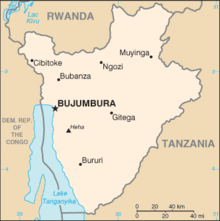1996 Burundian coup d'état
The 1996 Burundian coup d'état[1] was a military coup d'état that took place in Burundi on 25 July 1996. In the midst of the Burundi Civil War, former president Pierre Buyoya (a Tutsi) deposed Hutu President Sylvestre Ntibantunganya.[2] According to Amnesty International, in the weeks following the coup, more than 6,000 people were killed in the country. This was Buyoya's second successful coup, having overthrown Jean-Baptiste Bagaza in 1987.[2]
 | |
| Date | 25 July 1996 |
|---|---|
| Location | Bujumbura, Burundi |
| Type | Military coup |
| Motive | Regime change |
| Target | Presidential Palace, Bujumbura |
| Organised by | Pierre Buyoya |
| Outcome | Coup succeeds
|
| History of Burundi |
|---|
|
|
Burundi 1962–present
|
|
Current
|
Background
Tutsi Pierre Buyoya first came to power in Burundi following a military coup in September 1987, when he deposed Jean-Baptiste Bagaza.[3] Buyoya was president until the country's first democratic presidential election on 27 June 1993, which was won by Hutu Melchior Ndadaye. On 21 October, Ndadaye was assassinated, sparking the Burundi Civil War between Hutu and Tutsi groups. Moderate Hutu Cyprien Ntaryamira became president in February 1994, but both he and Rwandan president Juvénal Habyarimana were assassinated in April that year, an event that sparked the Rwandan genocide. Ntaryamira was succeeded by another Hutu leader, Sylvestre Ntibantunganya.
July 1996 events
On 21 July 1996, Hutu rebels attacked a refugee camp in the country and killed more than 300 people.[4] On 23 July, President Ntibantunganya went into hiding at the home of U.S. ambassador Morris N. Hughes, Jr.[5] The army took power on 25 July, a move announced over the radio by Defense Minister Firmin Sinzoyiheba. Pierre Buyoya was named interim president.[5] The military takeover was condemned by international leaders including U.S. president Bill Clinton, United Nations Secretary-General Boutros Boutros-Ghali and the head of the Organisation of African Unity, Salim Ahmed Salim.[5] It was the fourth such takeover of the Burundian government since the country's independence in 1962, and the second to result in Buyoya taking power.[5]
Aftermath
According to Amnesty International, in the weeks immediately following the coup, more than 6,000 people were killed in the country.[6] Buyoya was succeeded as president in 2003 by Domitien Ndayizeye. The civil war continued until 2005.
References
- "1".
- Palmer, Mark (2005). Breaking the Real Axis of Evil: How to Oust the World's Last Dictators by 2025. Rowman & Littlefield. p. 221. ISBN 0-7425-3255-0.
- Europa World Year, Book 1. Taylor & Francis. 2004. p. 946. ISBN 1-85743-254-1.
- Reuters (22 July 1996). "300 Slain in Attack on Camp For Refugees in Burundi Strife". The New York Times. Retrieved 6 June 2010.
- Buckley, Stephen (26 July 1996). "Army Seizes Power in Burundi; Ex-Ruler Replaces Leader Hiding in U.S. Envoy's Home". The Washington Post. p. A01. Retrieved 10 March 2015.
- "6,000 Reported Killed In Burundi Coup". The New York Times. 23 August 1996. Retrieved 5 June 2010.
